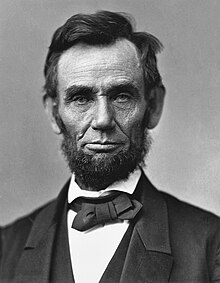President Abraham Lincoln
| Abraham Lincoln | |
|---|---|

President Lincoln in 1863
|
|
| 16th President of the United States | |
|
In office March 4, 1861 – April 15, 1865 |
|
| Vice President |
Hannibal Hamlin (1861–1865) Andrew Johnson (1865) |
| Preceded by | James Buchanan |
| Succeeded by | Andrew Johnson |
| Member of the U.S. House of Representatives from Illinois's 7th district |
|
|
In office March 4, 1847 – March 3, 1849 |
|
| Preceded by | John Henry |
| Succeeded by | Thomas L. Harris |
| Member of the Illinois House of Representatives | |
|
In office 1834–1842 |
|
| Personal details | |
| Born |
February 12, 1809 Sinking Spring Farm, near Hodgenville, Kentucky, U.S. |
| Died | April 15, 1865 (aged 56) Petersen House, Washington, D.C., U.S. |
| Cause of death | Assassination |
| Resting place |
Lincoln Tomb, Oak Ridge Cemetery, Springfield, Illinois, U.S. |
| Political party |
Whig (1834–1854) Republican (1854–1865) |
| Other political affiliations |
National Union (1864–1865) |
| Height | 6 ft 4 in (193 cm) |
| Spouse(s) | Mary Todd (m. 1842) |
| Children |
Robert Lincoln Edward Lincoln Willie Lincoln Tad Lincoln |
| Parents |
Thomas Lincoln Nancy Hanks |
| Profession | Lawyer, politician |
| Religion | See here |
| Signature | |
| Military service | |
| Allegiance |
|
| Service/branch | Illinois Militia |
| Years of service | 3 months (April 21, 1832 – July 10, 1832) |
| Rank | |
| Battles/wars | Black Hawk War |
| The Lincoln Cabinet | ||
|---|---|---|
| Office | Name | Term |
| President | Abraham Lincoln | 1861–1865 |
| Vice President | Hannibal Hamlin | 1861–1865 |
| Andrew Johnson | 1865 | |
| Secretary of State | William H. Seward | 1861–1865 |
| Secretary of Treasury | Salmon P. Chase | 1861–1864 |
| William P. Fessenden | 1864–1865 | |
| Hugh McCulloch | 1865 | |
| Secretary of War | Simon Cameron | 1861–1862 |
| Edwin M. Stanton | 1862–1865 | |
| Attorney General | Edward Bates | 1861–1864 |
| James Speed | 1864–1865 | |
| Postmaster General | Montgomery Blair | 1861–1864 |
| William Dennison Jr. | 1864–1865 | |
| Secretary of the Navy | Gideon Welles | 1861–1865 |
| Secretary of the Interior | Caleb Blood Smith | 1861–1862 |
| John Palmer Usher | 1863–1865 | |
Abraham Lincoln (![]() i/ˈeɪbrəhæm ˈlɪŋkən/; February 12, 1809 – April 15, 1865) was an American politician and lawyer who served as the 16th President of the United States from March 1861 until his assassination in April 1865. Lincoln led the United States through its Civil War—its bloodiest war and perhaps its greatest moral, constitutional, and political crisis. In doing so, he preserved the Union, paved the way to the abolition of slavery, strengthened the federal government, and modernized the economy.
i/ˈeɪbrəhæm ˈlɪŋkən/; February 12, 1809 – April 15, 1865) was an American politician and lawyer who served as the 16th President of the United States from March 1861 until his assassination in April 1865. Lincoln led the United States through its Civil War—its bloodiest war and perhaps its greatest moral, constitutional, and political crisis. In doing so, he preserved the Union, paved the way to the abolition of slavery, strengthened the federal government, and modernized the economy.
Born in Hodgenville, Kentucky, Lincoln grew up on the western frontier in Kentucky and Indiana. Largely self-educated, he became a lawyer in Illinois, a Whig Party leader, and was elected to the Illinois House of Representatives, in which he served for eight years. Elected to the United States House of Representatives in 1846, Lincoln promoted rapid modernization of the economy through banks, tariffs, and railroads. Because he had originally agreed not to run for a second term in Congress, and because his opposition to the Mexican–American War was unpopular among Illinois voters, Lincoln returned to Springfield and resumed his successful law practice. Reentering politics in 1854, he became a leader in building the new Republican Party, which had a statewide majority in Illinois. In 1858, while taking part in a series of highly publicized debates with his opponent and rival, Democrat Stephen A. Douglas, Lincoln spoke out against the expansion of slavery, but lost the U.S. Senate race to Douglas.
...
Wikipedia
